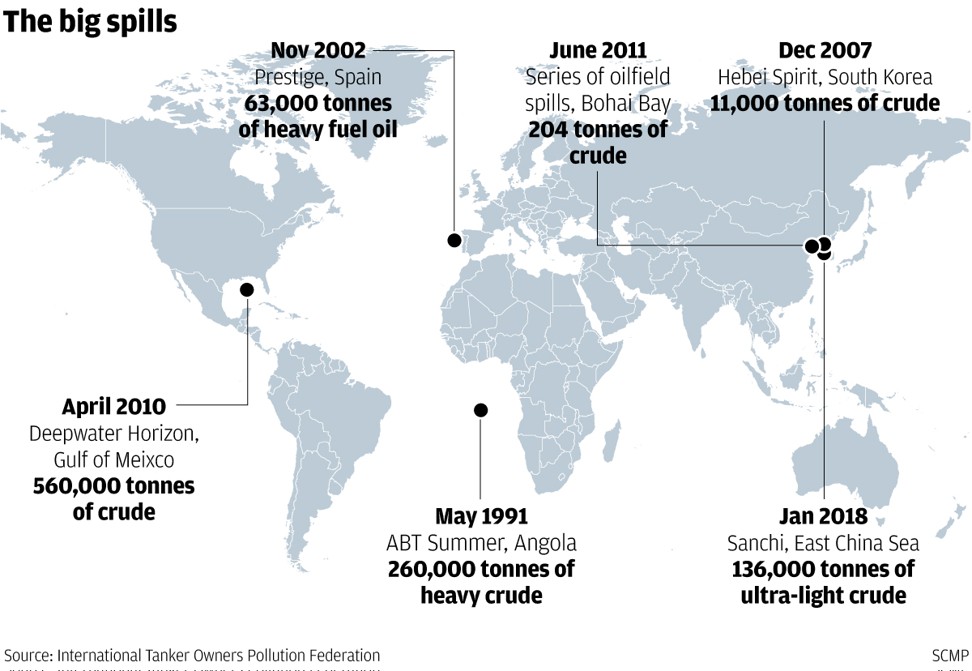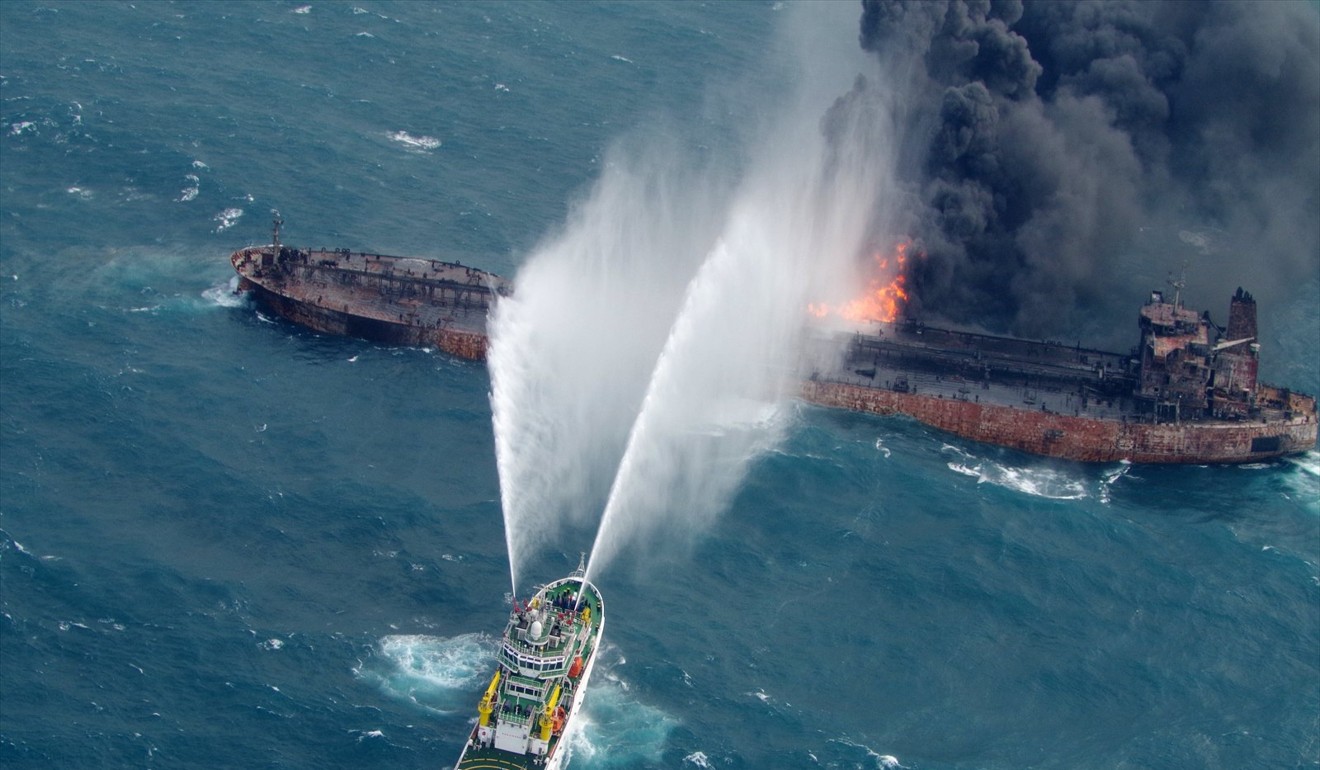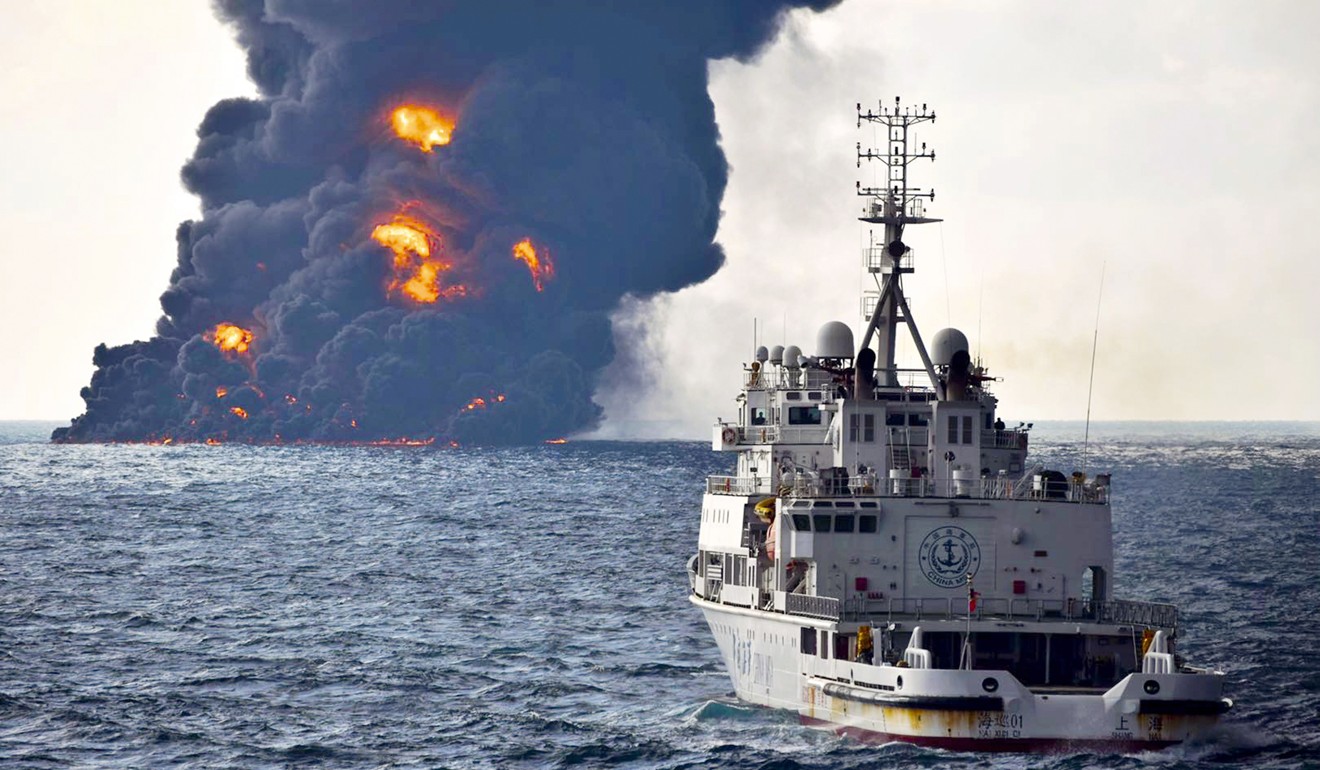
High alert for huge oil slick in East China Sea, but how bad will it be?
After tanker sinks along with cargo of light crude, scientists say it could be devastating for ecosystem already in danger from overfishing and pollution
A large oil slick and toxic fuel that sank with an Iranian tanker to the bottom of the East China Sea could threaten marine ecology and fishery resources, scientists warned, affecting China, Japan and South Korea.
The Panama-registered tanker Sanchi was carrying 136,000 tonnes, or nearly one million barrels, of condensate – an ultra-light, highly flammable crude oil – when it collided with Chinese freighter CF Crystal 160 nautical miles east of Shanghai on January 6.
That was twice the amount of fuel that went down with the Prestige oil tanker when it sank off the coast of Spain in November 2002, causing one of Europe’s worst environmental catastrophes.
The Sanchi caught fire and lost power after the collision and drifted southeast before exploding on Sunday and sinking 150 metres to the seabed midway between China’s Zhejiang province and Japan’s Ryukyu Islands.
The Japan Coast Guard said on Monday oil had spread over an area 13km (8.1 miles) long and 11km (6.8 miles) wide, although it said the slick was shrinking as patrol boats battled to contain it.
The Sanchi’s crew of 30 Iranians and two Bangladeshis are all believed to have perished in the incident, which was the biggest tanker spill since 1991, when 260,000 tonnes of oil leaked off the Angolan coast.

Chinese foreign ministry spokesman Lu Kang said rescue and clean-up efforts had been a focus for China from the beginning, but that Beijing welcomed “other relevant parties” to participate in both the search and rescue and treatment work.
Over winter, dominant winds over the East China Sea blow southward, according to a government researcher with the Key Laboratory of Physical Oceanography run by the Ministry of Education in Qingdao, Shandong.
That means Japanese islands such as Okinawa “may see some grease wash ashore” from the incident in the next few months, according to the researcher, who did not want to be named due to the sensitivity of the issue.

“The ship has been pushed around in the wind, so there will be oil coming to the surface. The wind direction can change a lot from one period to another, so the chances are, all of these countries will be affected,” said the official, who also requested anonymity.
It is still unclear how much oil went down with the ship, and officials and scientists are trying to count the remaining barrels after the vessel was ablaze for a week before it sank.
Li Zhengyan, a professor with the college of environmental science and engineering at Ocean University of China in Qingdao, said the accident happened in a major fishing area crowded by Chinese, Japanese and Korean ships.
“If the oil spill is large, it could wipe out some fish species that are sensitive to the toxicity of the condensate. This is not what has been spilled in the past – it’s particularly unnerving because we don’t know what it will do to the environment,” he said.
The East China Sea’s ecosystem was already in danger from overfishing and pollution, according to Li.
“Sanchi might be one of the last straws before the ecosystem collapses,” he added.
Oil researcher Li Yinfang, who is based in Yangzhou, Jiangsu, told Thepaper.cn that there was enough fuel on the Sanchi to fill 1,400 petrol stations.

Several mainland scientists told the Shanghai-based news website that leaking from the wreckage could contaminate the ocean floor and have a negative impact on the surrounding environment for decades to come.
However David Baxter, an assistant professor at the University of Hong Kong whose field is coral reef ecology and marine pollution, said the incident was tragic but its impact could be limited.
“It is a huge environmental impact for a lot of marine life, but nature is pretty good at cleaning it up,” Baxter said.
Oil regularly leaked to the sea floor around the world, he said, especially in places where oil extraction was prominent – and many organisms actually used that oil as an energy source.
Baxter said a more devastating impact was seen from the Deepwater Horizon disaster in the Gulf of Mexico in 2010, when an explosion on a drilling platform caused a massive oil spill that affected beaches and coastal wetlands.
“In the open ocean, the oil will be degraded naturally by microorganisms so the impact would be much less than the coast,” Baxter said.
He added that trawling and overfishing could have a far greater impact on marine life than the Sanchi spill.
The focus should now shift from salvage and recovery to assessment of the impact, said Paul Johnston from Greenpeace International’s Science Unit at the University of Exeter in the UK.
“Most importantly, this must include an assessment of how much condensate has entered the water and an assessment of the area contaminated,” he said in a statement on Monday.
“Surveillance and assessment by authorities is critical to understand the extent of the potential environmental impact and for deciding on the appropriate next steps in terms of salvage and recovery of the potential condensate spill,” he added.
Additional reporting by Reuters


